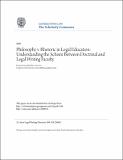|
Reseña:
|
The author argues that although legal writing faculty know that what they teach is absolutely essential to their students' success, yet it continues to be grossly, even embarrassingly, undervalued in legal education. Doctrinal legal faculty perpetuate the view that legal education is a philosophical endeavor that focuses on the truth about the nature of law and, in the twenty-first century, on the law's ability to serve justice in a multicultural America. Because of their political power, however, doctrinal faculty are able to preserve the task of truth finding for themselves. Since the nature of truth is independent of its practical application, those who teach legal writing are simply not part of the academy's intellectual enterprise. At best, they teach a process for conveying truth, and at worst, they teach students how to engage in the process of manipulation and domination. Because most legal writing faculty are women, and because they teach a process that lacks substance and perhaps even value, they are discriminated against. The author illustrates that both doctrinal and legal writing faculty teach truth: doctrinal faculty teach students the truth about a specific body of law and its evolution while legal writing faculty teach students how to interpret and apply that same truth in a specific contract.
Reseña: The author argues that although legal writing faculty know that what they teach is absolutely essential to their students' success, yet it continues to be grossly, even embarrassingly, undervalued in legal education. Doctrinal legal faculty perpetuate the view that legal education is a philosophical endeavor that focuses on the truth about the nature of law and, in the twenty-first century, on the law's ability to serve justice in a multicultural America. Because of their political power, however, doctrinal faculty are able to preserve the task of truth finding for themselves. Since the nature of truth is independent of its practical application, those who teach legal writing are simply not part of the academy's intellectual enterprise. At best, they teach a process for conveying truth, and at worst, they teach students how to engage in the process of manipulation and domination. Because most legal writing faculty are women, and because they teach a process that lacks substance and perhaps even value, they are discriminated against. The author illustrates that both doctrinal and legal writing faculty teach "truth": doctrinal faculty teach students "the truth" about a specific body of law and its evolution while legal writing faculty teach students how to interpret and apply that same truth in a specific contract.
|

